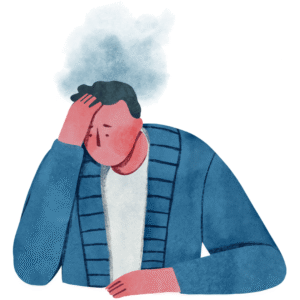Last night, I saw a scene of a husband who was laid off a month ago, but still leaves the house and goes to a cafe and works on finding a job. They were too embarrassed to share they were laid off with their wife, and it created chaos within the relationship. Layoffs have tremendous effect on our professional and personal life, this is why we identified layoff as a professional trauma.
Sadly, this wasn’t the first time I’ve seen a situation where the breadwinner/partner withheld their layoff from their partner. Most of the time, it’s because of shame and guilt for being in this situation, and they overwork to ensure the effects aren’t felt at home. And, sadly, that isn’t realistic. The financial impact of layoff have severe consequences, along with professional identity crisis people fall into, and the journey to rebuild can seem like a steep climb. But, just like the financial burdens, professional identities, and helping yourself or others overcome this challenge – it can take a toll on your marriage.
Today, we dive into how to manage the challenges of being laid off and speaking with your partner.
Losing a job is incredibly tough for anyone, bringing a wave of uncertainty and stress. But when that job loss happens to the primary earner (“breadwinner”) – it can create a unique and intense strain on a marriage. It’s not just about the money; it’s about identity, roles, and the very foundation of a partnership.
If you or your partner are navigating this challenging time, please know you’re not alone.
This post is here to explore how job displacement can impact marriages, why it’s unique, and most importantly, how couples can work together to strengthen their bond and build resilience through this storm.
Disclaimer: I’m a career counselor with a Masters degree in Marriage and Family Therapy. Couples support can look different, but what’s outlined is from my experience of helping individuals in a partnership to couples navigate challenges beyond career.

Working through job loss
When a partner experiences a trauma, it has ripple effects and the major life stressors can impact anyone and those closest to the person impacted. Layoffs have a severity similar to death of a family member or end of a relationship/divorce. It can change the dynamics of the relationship because someone you care about is processing through several emotional turmoil, along with professional insecurities, and financial burdens. For couples, this isn’t just an individual challenge; it creates a complex connection between job loss and marital strain, bringing a unique set of hurdles.
One of the key components in most couples is seeking security and safety, and working towards finding opportunities to help each other grow. The stress, uncertainty, and emotional toll of unemployment can test even the strongest marriages. It’s a tough reality, but understanding that carrying the trauma of a job loss alone will only separate the couple and it can significantly increase the chance of a divorce.
Often, it’s not the loss of job, but it’s the underlying challenges, the secrecy, the identity crisis, and so on…
As soon as we start identifying as “mine” and “yours” it starts to separate the challenge from the couple. It makes it a fight between the unit, and that can be challenging to overcome, even for the strongest marriages.

The "breadwinner" burden
Breadwinners are, usually, a sole earner who is responsible for supporting their family unit. Quite common until the mid-1900s, where both partners started working to provide for their family. The traditional role of “breadwinner” have been designated to the man in a relationship – A gender-specific role society still harbors, when it comes to dating, proposals, living together, and starting a family, where men pay first. This gendered role, “breadwinner”, have been internalized by most men – as the provider, professional, higher earner, career first mentality and identity, etc.
To compound on the complexity of the “breadwinner” title, women in relationships are seen as the “caretaker” or “homemaker” even when they have a full-time career and earn more. In same-sex couples, the title holds less significance because many couples focus on skills and individual partner’s needs and aspirations where professional identity is more equal.
The gendered expectations and internalized role of the breadwinner still hold true – where risk of marital issues are significantly higher if the man loses their job. This can be devastating for the family unit because the shame and guilt of losing a job can severely impact a core identity for most sole earners, this compounds with hiding the reality of the situation (Denial stage) from family and partner. When a man lose their job, they lose their primary identity, loss of income, unable to provide for their family (core value), higher anxiety, depression, anger, etc. all leading to higher risk of divorce (Gokce Basbug, Ofer Sharone, 2017, Silvia Mendolia, 2009). The complex emotional toll can ripple into drastic change in partnership and role reversal, where the partner become the sole earner of the family, which can further erode the self-esteem of the displaced individual.

Marital challenges
Professional trauma is rarely an isolated event, it has ripple effects that go beyond the person to the people around them, and it can take a toll of everyone if you aren’t taking care of yourself, and talking it with others around you. The more secretive you keep the trauma, the more it erodes your partnership and relationships. You can probably imagine all of these happening to someone, financial, emotional, social, aspirational, confidence, anxiety, depression, etc.
The strain of job loss on a marriage manifests in several interconnected ways:
Financial issues: This is often the most immediate and tangible consequence. The sudden disappearance of a steady income can lead to mounting bills, intense uncertainty about the future, and immense pressure to make ends meet. Couples might find themselves cutting back on everything, which can be a source of stress and disagreement.
Emotional toll: The anxiety, depression, and feelings of worthlessness that can accompany unemployment don’t just affect the individual; they impact both partners and the overall dynamics within the marriage. Spouses might find themselves on an emotional rollercoaster, trying to support each other while dealing with their own fears, and sometimes it might feel like the person supporting feels they aren’t able to process themselves leading to compassion fatigue. The emotional toll of a layoff is complex and with more people involved the more complex and more supported. Recognizing that it’s okay to express your frustration, sadness, anger, fears, etc. can help the process, but…
Communication breakdown: As the stress piles on, and emotions are on the rise our communication takes a backseat, when its healthier to be oversharing. The stress of unemployment can lead to increased tension and frustration, making it really challenging for partners to openly and effectively communicate their concerns and fears. Feelings of inadequacy, shame, or guilt about the job loss can create a barrier, making it hard to share hopes and dreams as they once did. And constant discussion of what’s going poorly is exhausting after a time, and this is where you need to focus on communicating the successes 5x more than the negatives. For example, sharing you’re feeling depressed for the job loss is valid and should be shared, and then saying, yet I submitted 2 job applications, made lunch, etc. is crucial to keep things balanced.
Social isolation: As we continue to feel more vulnerable, we look to retreat from people, partnership, etc. so we can wallow in our shame and embarrassment. This isolation can further exacerbate mental distress and reduce opportunities for external support that could benefit the couple.
Divorce rate increases because people stop talking to each other – openly and truthfully. A partnership feels like a one-way road and that’s not what built a successful family and marriage. It’s about give and take and talking through the uncomfortable feelings that get to the root and cause of the frustration so we can learn and become more resilient in our relationship.

Watch out for these signs
The Gottman Institute, leading marriage counseling research, identifies four qualities that lead to conflict and divorce: Criticism, Contempt, Defensiveness, and Stonewalling.
Criticism is blaming the partner for XYZ, where you’re meant to be a partnership working through a situation together. It’s encouraged to discuss what you feel by using “I —–” statements. This takes provides personal responsibility on emotion, thoughts, and creates opportunity for open discussion.
Contempt is feeling morally superior to the partner which can come off as sarcasm, ridicule, call them names, and mimic or use body language such as eye-rolling or scoffing. This leads to resentment and is the highest predictor of divorce. By treating each other with respect and appreciation you can build on what you’ve already accomplished together rather than thinking about how one is better than the other.
Defensiveness is an indirect way blaming your partner and playing the victim. It’s okay to self-protect and it’s important to recognize the part you play in creating the conflict. This might be tied to underlying core values and trauma that was triggered.
Stonewalling is when the listener withdraws from the conversation without resolving anything. It can become a habit when all three of the previous have been constant, but a 20-minute break during a disagreement can go a long way of having a healthy and healing conversation.
Recognizing these signs in your conversations and relationship is key that you may want external support and help. Once these styles of communication becomes common in a relationship, it can have detrimental influence on your relationship. Get support before it gets worse – a career counselor with Marriage and Family Therapy background can help.

Becoming more resilient in your marriage
While job loss can certainly strain a marriage, it doesn’t have to lead to divorce. The key lies in recognizing the previous signs and actively working towards navigating them. Here are some strategies to help you build a stronger foundation:
Open and honest communication: This is paramount. Encourage open and honest conversations about your challenges, fears, and feelings. Create a safe space where both partners can express themselves without judgment. This is KEY – without communication, everything falls apart.
Financial planning together: Work as a team to create a realistic budget that aligns with your current financial situation. Prioritize essential expenses, explore ways to reduce discretionary spending, and consider seeking financial advice to navigate this period. The more you and your partner know about your financial health the easier it’ll be to cope with the financial challenges.
Reassess priorities: Use this time of unemployment to reassess your priorities and values as a couple. This might involve re-evaluating long-term goals, career aspirations, and lifestyle choices. It can be an opportunity to align on what truly matters to both of you. What does “life success” look like for you?
Mutual support and empathy: Understand that both partners are likely on an emotional rollercoaster. Practice empathy, patience, and active listening. Remind each other that you’re a team facing this together.
Maintain routines and self-care: Encourage each other to maintain healthy routines, including adequate sleep, nutrition, and exercise. Self-care isn’t selfish; it’s crucial for managing stress and maintaining mental well-being for both partners.
Seek professional support: Don’t hesitate to seek professional guidance. A marriage counselor can provide tools for communication and conflict resolution, while a financial advisor can help navigate complex financial decisions. A minor investment in professional support can mean a major support for the long-term.
Leverage social support: Family and friends can provide crucial material, psychological, and moral resources during this time. Don’t be afraid to lean on your support system, and don’t shy away from setting boundaries.
Understand unemployment benefits: Unemployment insurance can actually play a vital role in mitigating financial stress and even reducing the risk of divorce, especially for childless men. Make sure to explore eligibility and benefits.
This too shall pass, but we can make it easier and faster
Losing a job, particularly for the breadwinner, presents significant challenges that can deeply strain a marriage. From financial pressures and emotional tolls to communication breakdowns and shifts in identity, the journey can feel overwhelming.
However, the power of a strong partnership lies in facing adversity together. By prioritizing open communication, collaborating on financial planning, offering mutual empathy and support, and not hesitating to seek professional guidance, couples can navigate these turbulent waters. This period, while difficult, can ultimately become a testament to your resilience and commitment, allowing you to emerge not just as individuals, but as a couple, stronger and more united than before. You have the strength within your partnership to turn this challenge into an opportunity for deeper connection and renewed purpose.
Working with a career counselor is crucial for supporting you during these challenging times. While you’re managing the financials remember a small investment can speed up your recovery and return to life after layoff, while improving your relationship. Schedule a free consultation to learn how I can help.

